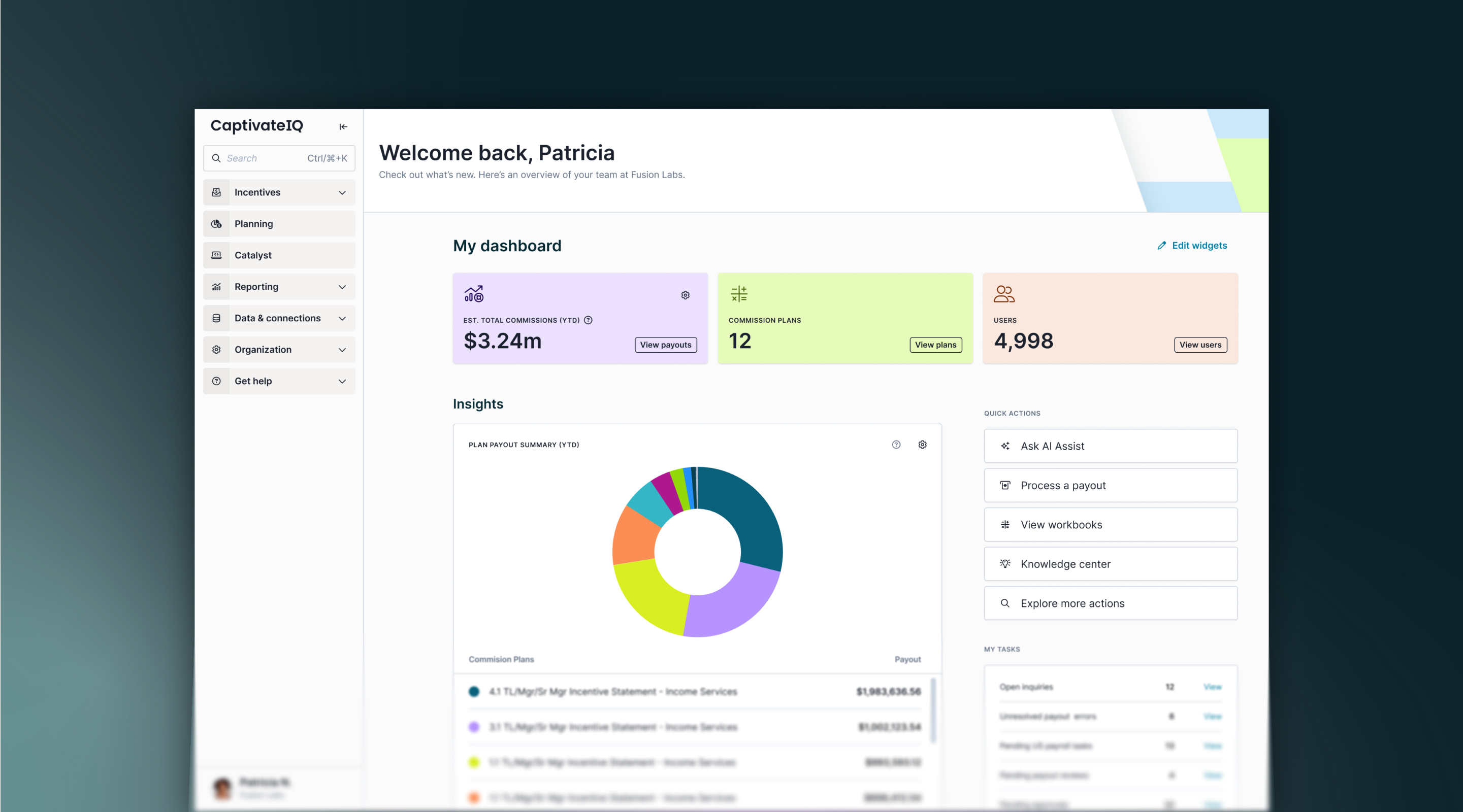How to Track Payouts Successfully
During a time when every revenue dollar matters more than ever, organizations need accurate, real-time sales commission tracking. Unfortunately, many businesses still rely heavily on spreadsheets and other outdated means of calculating commissions. Continued reliance on manual commission tracking can leave your company at increased risk for errors, delays, and low morale among your sales team.The good news is these pitfalls are easy to avoid. By introducing a modern sales commission software solution, you can reduce mistakes, save time, and better motivate your team to exceed their sales targets.
We'll take a look at some traditional means of sales commission tracking and the key to producing faster, more accurate commissions.
How do many of today's businesses track payouts?
Processing commissions is already a tedious task, and using Excel only makes it more complicated. Today, there are much better options in commissions-specific software... It was never designed to meet all of your business needs, and it certainly isn't the best choice for processing or tracking commissions for your sales team. - Kelsey Rosauer, Technology Advice
While there's a growing list of software solutions aimed at optimizing the sales commissions process, the reality is that many organizations are still tracking sales commissions manually in spreadsheets. Most businesses today are using a payroll solution such as ADP or Gusto to assure that their employees are paid accurately and on time. When you think about sales commissions, they are essentially a more complicated payroll because of the rules and logic involved in building an effective compensation plan. So it is mind-boggling that most companies are still using manual spreadsheets to process their commission calculations!
What are the shortcomings of manual tracking with Excel or Google Sheets?
The potential for error with manual commission tracking is unlimited. Corporate Financial Institute (CFI) notes that 88% of spreadsheets contain errors. These errors can be extremely costly for businesses that bring down productivity and even lead to lawsuits.
Though spreadsheets are considered among the most important and powerful tools for organizations and businesses over the past several decades, that doesn't take away the fact that spreadsheets are subject to human errors... When such errors take place frequently and become a habit, the risk increases... In fact, errors in spreadsheets happen very frequently, at an estimated rate of 88%. - Corporate Financial Institute
Tracking inaccuracies can disincentivize your top performers, confuse reps, and reflect poorly on your organization.
.png)
Other common downsides to spreadsheets include:
- Difficulty in scaling as businesses grow and need to roll out more complex incentive plans.
- Lack of transparency for commissionable reps who have little to no visibility into the calculations that live in those bulky spreadsheets.
- Inaccurate commission payments due to miscalculations from spreadsheet errors.
But it's not just sales reps who are losing out from this manual process. Here is a look at some specific ways manual tracking can stand in the way of business growth:
1. No transparency for leadership
C-suite leaders don't normally dive into each individual commission statement every month. Instead, Sales Directors and CFOs often review monthly reports that summarize total sales and gross profit. However, spreadsheets are unable to quickly identify which SaaS sales compensation plans are working and which ones are failing. Four of the top C-suite challenges are:
- Poor overall visibility and insight into sales performance
- Aggregate numbers don't show which compensation plans are most effective at driving revenue
- Comparing performance across representatives is difficult when multiple sales comp plans exist
- Motivating sales to achieve their goals is often a guessing game
2. Accounting and payroll barriers
Sometimes the commission calculation process can become so cumbersome that your accounting team may begin to dread the end of each sales cycle. They often end up shouldering the blame for commission inaccuracies and must try to remember which sales compensation plan every employee uses. Here are some common barriers faced by accounting and payroll staff:
- Manual commission calculations are extremely time-consuming
- Errors are more likely when commissions are manually calculated
- Accounting and payroll staff often bear the brunt of sales rep anger
- Challenges with compliance and auditing from a lack of data logs
3. Failure to achieve revenue goals
If your sales team is spending valuable time trying to resolve their commission errors and your accounting staff is spending hours manually updating spreadsheets, your organization will constantly be looking backward to fix pay disputes vs. looking forward to grow the business. Even worse, you run the risk of losing your most talented sales account executives due to frustrations regarding their commission calculations. This churn can harm enterprise sales and negatively impact your recurring revenue.
Is Salesforce an effective means of calculating incentives?
No. If you currently use Salesforce, it may be tempting to try to use it to set up your commission plans. After all, this strategy would enable you to have everything conveniently housed in one central location. And you could try to prevent the risks outlined above without investing in another software platform.But while Salesforce offers a host of attractive features for sales teams, it was really not designed as a commission rate calculation tool. Here are some key reasons why you shouldn't use Salesforce to calculate commissions:
- Salesforce allows some basic calculations but is not equipped to handle complex plans
- Salesforce often does not integrate well with accounting or payment platforms
- It lacks intuitive features and prompts to motivate users or optimize commissions
- Inability to create customize pay statements for teams to clearly understand their commissions
- No way to handle any disputes or inquiries among the team over their commission statements
These obstacles are not isolated to Salesforce. Others, such as Oracle HCM and SuiteCRM can consume a lot of resources as they were not specifically designed with sales commission calculation in mind. As a result, these platforms fall short for users who attempt to use them as a means of efficiently producing accurate commission reports.
What is the key to fast, accurate commission statements?
The key to fast, accurate commission reports is to automate your process with a flexible solution that can support necessary changes to comp plans. A sales commission software can automate calculations to save you days each month processing commissions. Not only will sales teams get paid more quickly, but you can also ensure accuracy because most commission software will integrate directly with your existing data. This results in happier sales reps and fewer pay discrepancies. With the right platform for your needs, you can enjoy the following benefits:
- A happier, more productive sales force that can focus on closing deals and growing your business instead of stressing over their commissions
- Greater transparency and visibility for your important salespeople to understand their performance and compensation
- Hours of time saved on manual calculations each month for the business admin or accountant
- The ability to spot and correct errors with ease in real-time to reduce miscalculations and pay disputes
- Clear and actionable reports for the leadership team to quickly understand overall performance and make recommendations
The platform you choose should allow you to identify opportunities for improvement among existing comp plans. Sales commission plans are not developed in a vacuum; they may need to be adjusted over time. With robust sales commission software, you can easily see which plans are producing the most revenue.
An effective practice element in plan design is to use the analytics capabilities of automated sales compensation technology solutions... Organizations need to identify what works and what does not work in existing plans and to use this information in designing new plans. - Society for Human Resource Management (SHRM)
Putting an end to your sales commission woes
Adding accuracy and clarity back into the commission process offer a host of advantages to organizations struggling with commission woes month after month. But what should you look for in a sales commission solution to start automating your commission calculations? And how can you introduce automation to your sales and customer success teams? If you're beginning to shop around for an automated software solution, be sure to check out our "What to look for in a sales commission solution" guide.
CaptivateIQ has helped hundreds of leading companies including Gong, Intercom, and Udemy simplify their commissions process to save hundreds of hours a year. If you'd like to modernize your sales process, we'd love to show you a product demo and put your sales commission woes behind you once and for all!
.svg)








